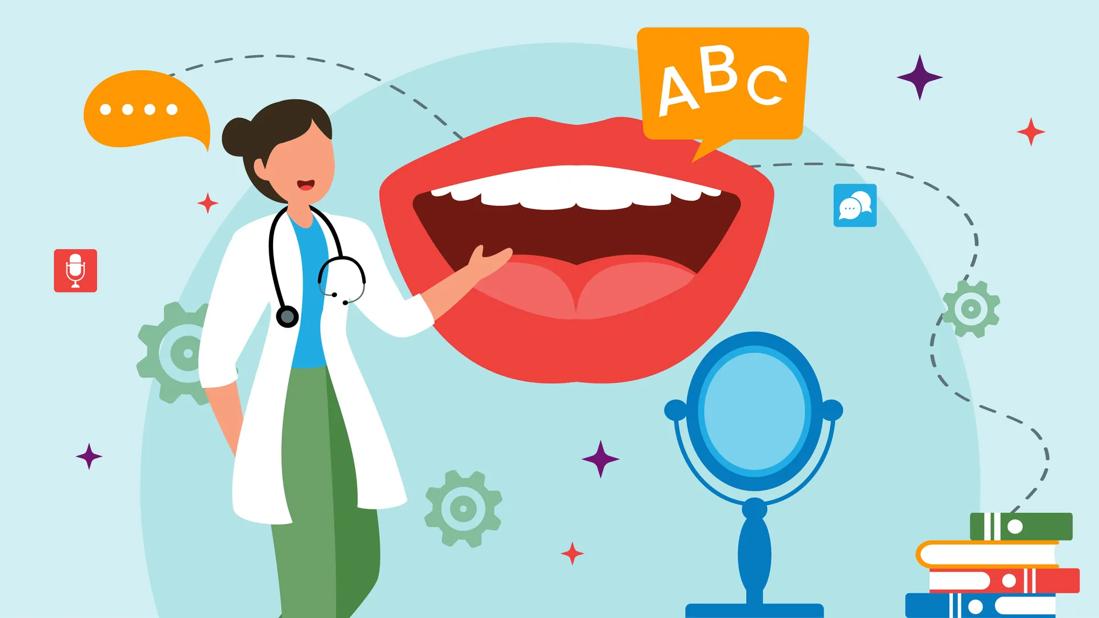Dysarthria affects how you speak, while aphasia impacts how you use and understand words

Image content: This image is available to view online.
View image online (https://assets.clevelandclinic.org/transform/9dbfaba4-e516-4d7c-8f19-0c4c816287ec/speech-therapist-mouth-tools-1538532734)
Speech therapist, with oversized mouth, letters, sounds and ideas
Our ability to speak and understand language is something we can take for granted. From toddlerhood on, our words just flow — day in and day out, often without thinking too much about them.
Advertisement
Cleveland Clinic is a non-profit academic medical center. Advertising on our site helps support our mission. We do not endorse non-Cleveland Clinic products or services. Policy
So, when something gets in the way of communicating, it can throw a big wrench in your life.
Neurological diseases, stroke, head injuries and other events can affect your speech and language abilities. Dysarthria and aphasia are two common neurological disorders that affect how you communicate.
What’s the difference between them? Speech-language pathologist Martin Brodsky, PhD, ScM, explains.
Dysarthria is a condition that affects your ability to physically produce words and sounds. Aphasia affects your ability to use the words you mean to.
“It’s the difference between a speech disorder and a language disorder,” Dr. Brodsky clarifies. “Dysarthria affects speech — how you form and produce words. Aphasia affects language, which is your ability to express your thoughts and understand others’ words.”
Damage to your brain or central nervous system causes dysarthria and aphasia. The location of the damage affects whether your speech or language centers (or both) are affected.
Both conditions can result from brain or nervous system damage, such as:
Importantly, neither dysarthria nor aphasia is a sign that there’s a problem with your thinking. And they’re not a reflection of your intelligence.
Advertisement
“Dysarthria and aphasia usually have no impact on cognition,” Dr. Brodsky confirms. “They limit your ability to respond — not your ability to think.”
People with dysarthria have damage to their brain or nervous system that keeps them from speaking clearly.
Speech takes coordination. Your tongue, lips, teeth, vocal cords, airflow and even rhythm all work together to form words and sentences. Any disruptions along the way can keep you from properly forming and pronouncing words. That means your speech may sound:
Dr. Brodsky points out that the speech patterns associated with dysarthria can be mistaken for drunkenness, which can be a real problem.
“Imagine you get pulled over, and when you speak, you’re slurring,” he illustrates. “So, the officer asks you to walk a straight line. If you’ve had a stroke or another condition that affects your balance, too, they can easily assume you’re intoxicated.”
People with aphasia speak clearly, with crisp sounds and well-paced sentences. But they may use the wrong words.
It’s not that your thinking is flawed, though. Your brain is still forming cohesive and complex thoughts. But there’s a break in the bridge that connects the words you plan to use and the words that come out of your mouth.
For example, you may mean to say, “Can you pass me the salt?” But what comes out is “Can you eat the table?” Or you might want to say, “I’m tired,” but instead say, “I’m water.” Or you may say words that aren’t words at all — “Where are my gleets?” instead of “keys.”
People with aphasia can find it tough to understand other people’s speech, too. And it can cause trouble reading or writing words.
“Aphasia affects communication across multiple modes of language — spoken, written, heard and read,” Dr. Brodsky says. “That’s part of the difference between speech disorders like dysarthria and language disorders like aphasia. Speech disorders only affect your spoken words.”
Living with a speech or communication disorder can be frustrating. When you can’t give voice to your thoughts in ways that others understand, it can affect your confidence, your relationships and your well-being.
If you or a loved one is experiencing speech or language difficulties, talk with a healthcare provider. Depending on your needs, they may recommend exercises and assistive technologies to help.
Advertisement

Sign up for our Health Essentials emails for expert guidance on nutrition, fitness, sleep, skin care and more.
Learn more about our editorial process.
Advertisement
3 steps to take if you suspect a problem
Strokes affect your brain, while heart attacks affect your heart — both can be life-threatening emergencies
Options for your changing mobility range from small swaps to major renovations
To help preserve your cognitive function, try to keep your brain active, manage fatigue and learn new organizational skills to conserve energy
Start weaning your toddler off daytime pacifier use by 12 months old to help prevent dental issues and speech delays
A vagus nerve reset can help to relieve stress and find calm
From faster diagnoses to less paperwork, healthcare providers are using artificial intelligence to help take better care of you
Certain components found in wine like tannins and histamines may be the culprit
Prioritize your health by managing stress, strengthening your social connections and getting quality sleep
Bolsters, blankets, pillows and blocks can offer extra support, stability and comfort
Allergies, postnasal drip, asthma or reflux could be to blame for a cough that won’t quit